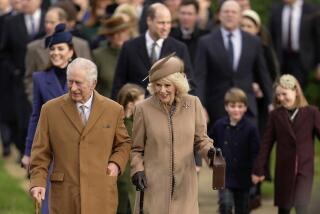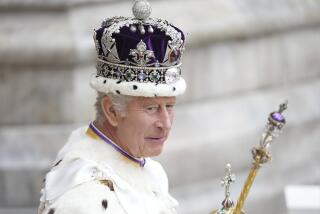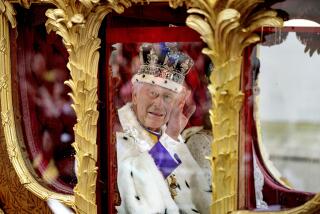Regional Outlook : Rethinking Royalty in the Bleak Balkans : Political decay and poverty are factors fueling movements to restore monarchs to their thrones.
- Share via
BUCHAREST, Romania — A rumored military plot in Romania, a power vacuum in Bulgaria and idealistic hopes for a white-knight rescue of the disintegrating state of Yugoslavia have spun a web of Byzantine intrigue between troubled Balkan peoples and their exiled kings.
Proposals for reinstating monarchs deposed by communism--dismissed as fanciful a year ago--have lately solidified into serious movements and given rise to expectations that some of Europe’s most controversial dynasties may rule again.
Spurring the Balkan peoples to look to their past for inspiration for the future is the bleak panorama of poverty and political tumult. Communist dictators drove farms and factories into ruin, and democratically elected leaders have been powerless to arrest the decline. With nowhere else to turn for encouragement, the Balkans are reconsidering their rejected royals.
The most anxious to be accommodating is Romania’s King Michael, whose clandestine return to his homeland over Christmas drew official ire and fed suspicions that he seeks to stir the simmering pot of Romanian politics.
(The government subsequently said it had restored the former monarch’s citizenship, although King Michael’s office in Geneva said it had no confirmation.)
Romania has been racked with unrest as the National Salvation Front has struggled to keep the power it seized a year ago after a popular revolt toppled dictator Nicolae Ceausescu.
Michael, 69, flew to Bucharest on Christmas Day--the anniversary of Ceausescu’s execution by firing squad--for what he described as a private visit. It was his first return to Romania since the Communists forced him to abdicate in 1947.
Romanian Defense Minister Victor Stanculescu reportedly paid a visit to Michael at his home near Geneva last fall, fueling speculation that the king’s complicity was being sought in a military coup that would restore the monarchy.
Michael previously said he wanted to return to Romania as the head of state in a constitutional monarchy, but only with the support of the Romanian population.
During their interrupted Christmas visit, Michael, his French-born wife Ana de Bourbon-Parma, and one of the couple’s five daughters cleared border formalities with their Danish diplomatic passports. But the entourage was stopped by a 30-vehicle police blockade en route to a family burial ground at Curtea de Arges, about 90 miles west of Bucharest, and all were returned to the airport and deported.
The timing of Michael’s visit raised questions about his intentions and the veracity of previous claims to want no role in Romanian politics.
By returning amid the disorder and confusion that mark Bucharest today, the king may have been hoping to provide a lightning rod for a second revolution that would restore the monarchy as part of other political changes.
The king ignored the advice of Prime Minister Petre Roman, who had warned him not to return, because “he felt he had a role to play in Romania,” said family spokeswoman Danielle Maillefer.
Michael also urged his would-be subjects to throw off the shackles by completing their democratic revolt. In a New Year’s address broadcast in Romanian to his native land, he accused the Bucharest leadership of presenting “the same dictatorship with a new face.”
Flashes of royalist support have flared up across Romania recently, but the depth and breadth of the monarchy’s backing are difficult to fathom in the current political climate.
Romanian dynasties have a tarnished past, encompassing the likes of 15th-Century tyrant Vlad Dracula the Impaler and Michael’s own father, King Carol II, who abandoned the throne in 1925 to flee abroad with his mistress, then returned to conspire with fascists in the years before World War II.
Michael, who descends from the Hohenzollerns of the Austro-Hungarian empire, served under a regent during his father’s absence from 1927 to 1930, then again from 1940 to 1947, when the Communists took power.
Romanian President Ion Iliescu ruled out a return of the monarchy during his spring election campaign, and his victory with 87% of the vote for head of state indicated, at least then, that public opinion was against a return of the king.
But on Romania’s Dec. 1 national day, thousands rallied in Bucharest and in the Transylvanian city of Alba Julia, chanting “King Michael, King Michael,” in a plea for the royal family’s return.
In September, hundreds stood and wept when the Bucharest Philharmonic Orchestra played an old monarchist anthem for the first time since Michael was exiled 43 years ago.
“We want a return of the king as a stability factor,” said Dan Preunca, a 21-year-old chemistry student at a late-December protest in Timisoara. “He doesn’t have to have political power, but rather should serve as a unifying force.”
In neighboring Bulgaria, the monarchist movement is only beginning to make itself known, and supporters of King Simeon have chosen a more careful path in campaigning for his return.
The newly formed Monarchist Club has organized charitable work in the name of the crown to generate broader public knowledge of the Bulgarian monarchy that has gone virtually unmentioned for more than four decades.
“Children here have been educated in socialist schools and have no idea of the monarchy,” said George Malinov, a prominent Sofia dramatist and head of the Monarchist Club. “We believe the best guarantee of quick economic advance is a personality with authority, like Simeon, who is both respected and trusted.”
Part of Simeon’s appeal has been his own prosperity. A self-made businessman who married a Spanish aristocrat and lives in a villa outside Madrid, the 53-year-old king symbolizes the success and affluence that impoverished Bulgarians can only dream of.
Crowned at the age of 6 and forced to flee three years later, after the Communist coup of 1946, Simeon has little familiarity with the ways of his people, which some concede is an obstacle to his acceptance among Bulgarians who have recently proceeded from dictatorship to disorder.
“I’m afraid he doesn’t know our people because he hasn’t lived here. We have a very specific psychological makeup,” explained Janet Stoichev, a painter who advocates Simeon’s return. “He realizes himself that this is a problem.”
A power vacuum has been created in Bulgaria since disenchanted voters forced the elected Socialist leaders out of office in late November. But royalists say it is too soon for their monarch’s return.
Simeon has said he would consider restoration of the Bulgarian dynasty if a broad segment of the population so desired. But he has indicated he feels he can do more for the country from abroad, and even supporters concede he would be little more than a model for initiative if he returned.
Bulgarian monarchs have a better reputation than their counterparts in Romania, but Simeon’s return would likely reopen old wounds. Communists disinterred the body of Simeon’s father, King Boris, from the family cemetery where he was buried in 1943, and its whereabouts remains a mystery today.
One Balkan monarch eager for his first chance to rule is Crown Prince Alexander of Serbia, heir to the throne of the Karadjordjevic family.
Alexander said in a recent telephone interview that he expects 1991 to be decisive in restoring the monarchy to Yugoslavia.
He dismissed suggestions that the December election victory of hard-line Communists in Serbia was a setback, describing himself as “the meeting point, the unity point, the continuity point, the beacon of hope for democracy and stability.”
A 45-year-old financial consultant in Britain, Alexander was born in a hotel room at London’s Claridge’s after his family fled Yugoslavia in 1945. To satisfy rules for ascension that require all monarchs to be born on national soil, the British government allowed the hotel room to be declared Yugoslav territory.
The Serbian Royalist Bloc that ran candidates in the Dec. 9 election fared poorly, but President Mihailo Mladenovic said support for the royal family is nevertheless strong.
“We think that within 15 months there will have to be new elections,” Mladenovic said, echoing concerns throughout Yugoslavia that the current mix of democratic and socialist republics is too volatile to survive. “I think the next time will be a big defeat for the Socialists, and there will be a return of the monarchy.”
While Balkan neighbors look to their former kings to provide symbols and an example for success, Serbian monarchists have even more ambitious expectations of their exiled leader. They are hoping a royal figurehead could help overcome centuries of hatred between Serbs and Croats--an expectation that Alexander’s forebears were never able to fulfill.
Alexander said he was already negotiating with Croatian leaders in hopes of establishing a new order in Yugoslavia that would preserve the political alliance and prevent civil war.
More to Read
Sign up for Essential California
The most important California stories and recommendations in your inbox every morning.
You may occasionally receive promotional content from the Los Angeles Times.














